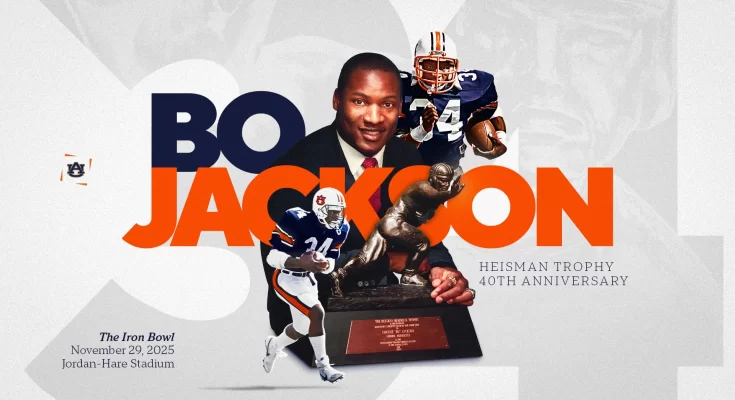Auburn Athletics has revealed that this fall’s Iron Bowl will serve as a heartfelt tribute to Bo Jackson, marking the forty‑year milestone of his unforgettable 1985 Heisman Trophy victory. From the moment he stepped foot on the Plains in 1982, Bo Jackson embodied the spirit of Auburn in ways that transcended sports. Now, four decades later, the university seeks to honor not just an athlete, but a legend whose impact resonates on and off the field (auburntigers.com, https://www.wsfa.com).
In 1985, Jackson electrified college football. He rushed for 1,786 yards—still the second‑best single‑season total in SEC history when compared with Georgia’s Herschel Walker in 1981—and powered his way to 17 rushing touchdowns while maintaining a remarkable average of 6.4 yards per carry (auburntigers.com, Wikipedia). Auburn finished the season at 8‑4 under head coach Pat Dye, earning a berth in the Cotton Bowl Classic—a fitting cap to a dazzling campaign (Wikipedia). That performance earned Jackson the Heisman Trophy in perhaps one of the tightest races ever, outpacing Iowa quarterback Chuck Long to secure Auburn’s second ever win of the prestigious award, following Pat Sullivan’s triumph in 1971 (auburntigers.com, Wikipedia).
Those numbers, though impressive on their own, only begin to capture the magic Jackson brought to college sports. He was a rare, transcendent talent whose athletic brilliance spanned football, baseball, and track. Auburn’s athletic director, John Cohen, captured it succinctly: “Ever since he arrived on the Plains in 1982, Bo Jackson has represented Auburn in a world‑class manner in his athletic, professional and philanthropic endeavors.” Cohen added, “Bo’s 1985 season ranks among the greatest in the storied history of Auburn and the Southeastern Conference. It is our privilege to honor Bo on the 40th anniversary of his Heisman Trophy season.” The sentiment reflects not only an admiration for his on‑field feats, but his character and contributions beyond athletics (auburntigers.com, https://www.wsfa.com, SI).
By the end of his collegiate career, Jackson had amassed 4,303 rushing yards and 4,575 all‑purpose yards, alongside 43 rushing touchdowns—statistics that etched his name at the top of Auburn’s record books (auburntigers.com, Wikipedia). His legacy was formalized during Auburn’s centennial celebration in 1992, when his No. 34 jersey was officially retired—a rare honor reflecting the indelible mark he left on the university (auburntigers.com).
But Bo Jackson’s legend extends far beyond the college gridiron. He went on to become the only athlete ever to be named an All‑Star in both Major League Baseball and the NFL—a testament to his unparalleled athleticism and versatility (Wikipedia). He spent four seasons in the NFL with the Los Angeles Raiders (formerly Oakland), piling up 2,782 rushing yards and 16 touchdowns before a devastating hip injury in 1991 prematurely cut his football career short (auburntigers.com, https://www.wsfa.com, Wikipedia). In baseball, Jackson enjoyed eight seasons across the Kansas City Royals, Chicago White Sox, and California Angels, earning accolades such as the 1989 All‑Star Game MVP and the 1993 American League Comeback Player of the Year (auburntigers.com, https://www.wsfa.com, Wikipedia).
All these elements feed into the aura surrounding Jackson: not just a player who dominated his era, but one whose success multiplied across sports and whose presence continues to inspire. Auburn’s tribute at the Iron Bowl, set for November 29 at Jordan‑Hare Stadium, will be a celebration of that legacy on one of the biggest stages in college football—the storied rivalry of Auburn vs. Alabama
The timing carries special poignancy. Forty years ago, during that unforgettable 1982 “Bo Over the Top” play, Jackson leaped over the line on fourth down to score the game‑winning touchdown against Alabama—a play that cemented his legend even before the Heisman came into view (Wikipedia, AOL). That moment has endured in Iron Bowl lore, emblematic of Jackson’s daring, athletic audacity, and competitive fire. The 40th anniversary tribute thus bridges two defining moments—his early magic and his crowning achievement.
Beyond nostalgia, Auburn’s honoring of Jackson underscores the continued values he represents: excellence, versatility, humility, and giving back. Even during his playing days, he carried himself with a rare combination of humility and intensity. And after his career, he remained closely tied to Auburn. While not directly referenced in the Iron Bowl announcements, his post‑playing roles—such as mentoring younger athletes and engaging in philanthropic work—have reinforced his status as a role model within the Auburn community and beyond
In celebrating Bo Jackson at the Iron Bowl, Auburn rekindles the memory of a defining athletic season, one that left an enduring mark on college football and on the cultural imagination. The tribute serves as an opportunity for current players, students, fans, and alumni to reflect on how one man’s exceptional achievements helped shape the identity of an athletic program and a university.
As the autumn sun sets late over Jordan‑Hare Stadium on November 29, the crowd will roar not just for the rivalry, but in recognition of a legacy four decades in the making. Auburn honors Bo Jackson not merely for what he did, but for who he became—a standard of greatness, a bridge between eras, an extraordinary athlete, and above all, a cherished Tiger forever.



